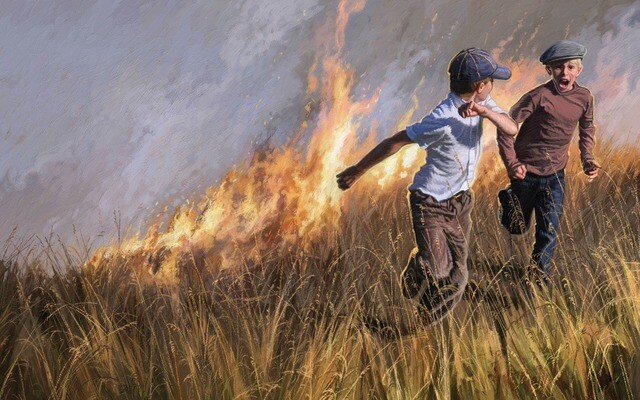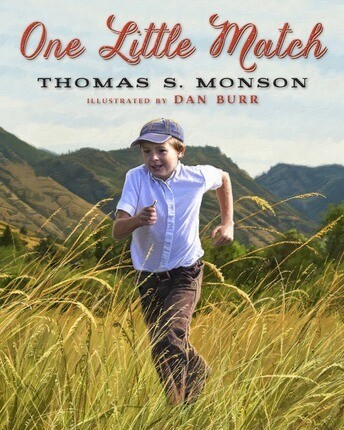Our Savior taught many of His most profound lessons through stories—stories that seemed simple at first, but contained layers and facets of meaning that brought listeners to a new level of understanding. He shared relatable moments from daily life mixed with unexpected lessons, insights, and tales.
Many of our modern day apostles have learned from Christ's example, developing quite the knack for storytelling. And, over the years, the pulpit in the conference center has been graced with many surprising, charming, touching, and humorous stories.
From funny and quirky to intensely emotional or frightening, there have been a lot of hidden gems in the stories shared at general conference, but here are some of the most unexpected.
Blind Date Fiasco
Joseph B. Wirthlin, "Come What May, and Love It," October 2008
Little mishaps and embarrassments are a part of life, but Elder Wirthlin was always good to remind us to laugh at these little moments, even in general conference. Watch the talk in the player below or read the story under the player.
“I remember when one of our daughters went on a blind date. She was all dressed up and waiting for her date to arrive when the doorbell rang. In walked a man who seemed a little old, but she tried to be polite. She introduced him to me and my wife and the other children; then she put on her coat and went out the door. We watched as she got into the car, but the car didn’t move. Eventually our daughter got out of the car and, red-faced, ran back into the house. The man that she thought was her blind date had actually come to pick up another of our daughters who had agreed to be a babysitter for him and his wife.
“We all had a good laugh over that. In fact, we couldn’t stop laughing. Later, when our daughter’s real blind date showed up, I couldn’t come out to meet him because I was still in the kitchen laughing. Now, I realize that our daughter could have felt humiliated and embarrassed. But she laughed with us, and as a result, we still laugh about it today.
“The next time you’re tempted to groan, you might try to laugh instead. It will extend your life and make the lives of all those around you more enjoyable.”
Wiggling Ears
Thomas S. Monson, "Examples of Righteousness," April 2008
Who could forget when President Monson, in his first conference as the prophet, demonstrated a skill hardly any Church members knew he possessed—the ability to wiggle his ears!
“My brethren, I reiterate that, as holders of the priesthood of God, it is our duty to live our lives in such a way that we may be examples of righteousness for others to follow. As I have pondered how we might best provide such examples, I have thought of an experience I had some years ago while attending a stake conference. During the general session, I observed a young boy sitting with his family on the front row of the stake center. I was seated on the stand.
“As the meeting progressed, I began to notice that if I crossed one leg over the other, the young boy would do the same thing. If I reversed the motion and crossed the other leg, he would follow suit. I would put my hands in my lap, and he would do the same. I rested my chin in my hand, and he also did so. Whatever I did, he would imitate my actions. This continued until the time approached for me to address the congregation.
“I decided to put him to the test. I looked squarely at him, certain I had his attention, and then I wiggled my ears. He made a vain attempt to do the same, but I had him! He just couldn’t quite get his ears to wiggle. He turned to his father, who was sitting next to him, and whispered something to him. He pointed to his ears and then to me. As his father looked in my direction, obviously to see my ears wiggle, I sat solemnly with my arms folded, not moving a muscle. The father glanced back skeptically at his son, who looked slightly defeated. He finally gave me a sheepish grin and shrugged his shoulders.
“I have thought about that experience over the years as I’ve contemplated how, particularly when we’re young, we tend to imitate the example of our parents, our leaders, our peers. The prophet Brigham Young said: “We should never permit ourselves to do anything that we are not willing to see our children do. We should set them an example that we wish them to imitate.”
“To you who are fathers of boys or who are leaders of boys, I say, strive to be the kind of example the boys need.”
A Sailor Blessing the Sacrament
Henry B. Eyring, "Learning in the Priesthood," April 2011
In this priceless talk, Elder Eyring went off script for a few moments as he indulged in some of the memories of his past living in a "tough neighborhood."
Impressing Future Mother-in-Laws
Dieter F. Uchtdorf, "Your Happily Ever After," April 2010
What could say true love more than taking your mother-in-law on a romantic bike ride to church?

“Let me share with you a personal experience I had as a teenager while our family was attending church in Frankfurt, Germany.
“One Sunday the missionaries brought a new family to our meetings whom I hadn’t seen before. It was a mother with two beautiful daughters. I thought that these missionaries were doing a very, very good job.
“I particularly took notice of the one daughter with gorgeous dark hair and large brown eyes. Her name was Harriet, and I think I fell in love with her from the first moment I saw her. Unfortunately, this beautiful young woman didn’t seem to feel the same about me. She had many young men who wanted to make her acquaintance, and I began to wonder if she would ever see me as anything but a friend. But I didn’t let that deter me. I figured out ways to be where she was. When I passed the sacrament, I made sure I was in the right position so that I would be the one to pass the sacrament to her.
“When we had special activities at church, I rode my bike to Harriet’s house and rang the doorbell. Harriet’s mother usually answered. In fact, she opened the kitchen window of their apartment on the fourth floor and asked what I wanted. I would ask if Harriet would like a ride to church on my bicycle. Harriet’s mother would say, “No, she will be coming later, but I will be happy to ride with you to church.” This wasn’t exactly what I had in mind, but how could I decline?
“And so we rode to church. I must admit I had a very impressive road bike. Harriet’s mother sat on the top tube bar just in front of me, and I tried to be the most elegant bicycle driver over roads of rough cobblestone.
“Time passed. While beautiful Harriet was seeing many other young men, it seemed that I could not make any headway with her.
“Was I disappointed? Yes.
“Was I defeated? Absolutely not!
“Actually, looking back I recognize that it doesn’t hurt at all to be on good terms with the mother of the girl of your dreams.”
Spiritual Crocodiles
Boyd K. Packer, "Spiritual Crocodiles," April 1976
With a dash of wildlife and heaps of adventure, President Packer shared this incredible story that became so popular it was turned into a seminary video.
He Refused to Let Me Fall
Jeffrey R. Holland, "Where Justice, Love, and Mercy Meet," April 2015
This story is bound to get your adrenaline pumping! Elder Holland's intensity and eloquence will help you better understand the Atonement of Jesus Christ through this story of a hiking trip gone wrong for two brothers.
Dirty Windows
Thomas S. Monson, "Charity Never Faileth," October 2010
While humorous, this story leaves a lasting impression on the listener of how judging others can distort our perceptions.
Can You Hear the Music?
Wilford W. Andersen, "The Music of the Gospel," April 2015
Profound and filled with melodic and musical imagery, this entire talk is one worth listening to again and again!
Years ago I listened to a radio interview of a young doctor who worked in a hospital in the Navajo Nation. He told of an experience he had one night when an old Native American man with long braided hair came into the emergency room. The young doctor took his clipboard, approached the man, and said, “How can I help you?” The old man looked straight ahead and said nothing. The doctor, feeling somewhat impatient, tried again. “I cannot help you if you don’t speak to me,” he said. “Tell me why you have come to the hospital.”
The old man then looked at him and said, “Do you dance?” As the young doctor pondered the strange question, it occurred to him that perhaps his patient was a tribal medicine man who, according to ancient tribal customs, sought to heal the sick through song and dance rather than through prescribing medication.
“No,” said the doctor, “I don’t dance. Do you dance?” The old man nodded yes. Then the doctor asked, “Could you teach me to dance?”
The old man’s response has for many years caused me much reflection. “I can teach you to dance,” he said, “but you have to hear the music.”
Sometimes in our homes, we successfully teach the dance steps but are not as successful in helping our family members to hear the music. And as the old medicine man well knew, it is hard to dance without music.
Pulling Teeth for Charity
A. Theodore Tuttle, "Service Saves," October 1977
What a sweet and humorous example these children are of sacrificing all they can to help others.
The last time I spoke from this pulpit I explained a special need to help local missionaries from some of the missions in South America. In most of these countries the annual income averages less than 10 percent of what it is here. I explained that these young people had already sacrificed much, and that they would need additional financial help from those of us who could easily share. I didn’t really appeal for funds. I outlined a need.
This is my first opportunity to express thanks to so many for helping these missionaries—even without being asked! . . .
A mother wrote, “After October conference, in family council, we decided to earn some money not to spend it for Christmas, but to send it to missionaries. The boys, ages five and six, gathered cans for refunds, stacked wood, raked leaves, vacuumed the car, and swept the garage. Two-year-old Becky stacked wood and set the table. Mom gave piano lessons. Daddy cracked his piggy bank of eight years. One boy lost a tooth, and Daddy paid him a quarter for it. He promptly loosened and removed two more for an additional fifty cents! We are sending our total earnings ($81.85). It’s been a pleasure.”
The shortest letter read, “Per your instructions last general conference. Sincerely. …”
Aside from some concern about possible toothless youngsters, I commend you all. Thank you, brothers and sisters.
One Little Match
Thomas S. Monson, "Obedience Brings Blessings," April 2013
We love President Monson's candor and sense of humor.

When I was growing up, each summer from early July until early September, my family stayed at our cabin at Vivian Park in Provo Canyon in Utah.
One of my best friends during those carefree days in the canyon was Danny Larsen, whose family also owned a cabin at Vivian Park. Each day he and I roamed this boy’s paradise, fishing in the stream and the river, collecting rocks and other treasures, hiking, climbing, and simply enjoying each minute of each hour of each day.
One morning Danny and I decided we wanted to have a campfire that evening with all our canyon friends. We just needed to clear an area in a nearby field where we could all gather. The June grass which covered the field had become dry and prickly, making the field unsuitable for our purposes. We began to pull at the tall grass, planning to clear a large, circular area. We tugged and yanked with all our might, but all we could get were small handfuls of the stubborn weeds. We knew this task would take the entire day, and already our energy and enthusiasm were waning.
And then what I thought was the perfect solution came into my eight-year-old mind. I said to Danny, “All we need is to set these weeds on fire. We’ll just burn a circle in the weeds!” He readily agreed, and I ran to our cabin to get a few matches.
Lest any of you think that at the tender age of eight we were permitted to use matches, I want to make it clear that both Danny and I were forbidden to use them without adult supervision. Both of us had been warned repeatedly of the dangers of fire. However, I knew where my family kept the matches, and we needed to clear that field. Without so much as a second thought, I ran to our cabin and grabbed a few matchsticks, making certain no one was watching. I hid them quickly in one of my pockets.
Back to Danny I ran, excited that in my pocket I had the solution to our problem. I recall thinking that the fire would burn only as far as we wanted and then would somehow magically extinguish itself.
I struck a match on a rock and set the parched June grass ablaze. It ignited as though it had been drenched in gasoline. At first Danny and I were thrilled as we watched the weeds disappear, but it soon became apparent that the fire was not about to go out on its own. We panicked as we realized there was nothing we could do to stop it. The menacing flames began to follow the wild grass up the mountainside, endangering the pine trees and everything else in their path.
Finally we had no option but to run for help. Soon all available men and women at Vivian Park were dashing back and forth with wet burlap bags, beating at the flames in an attempt to extinguish them. After several hours the last remaining embers were smothered. The ages-old pine trees had been saved, as were the homes the flames would eventually have reached.
Danny and I learned several difficult but important lessons that day—not the least of which was the importance of obedience.
Burning Trucks
W. Craig Zwick, "What Are You Thinking?" April 2014
It's always good to remember to temper our words and to use the limitless power of language and communication to build rather than to demean.
Forty-one years ago I climbed into the driver’s seat of an 18-wheel semi truck with my beautiful wife, Jan, and our infant son, Scotty. We were taking a heavy load of construction materials across several states.
In those days there were no seat-belt restrictions or infant car seats. My wife held our precious son in her arms. Her comment “We sure are high off the ground” should have given me a clue about her feelings of apprehension.
As we made our descent over historic Donner Pass, a steep section of highway, the cab of the semi suddenly and unexpectedly filled with thick smoke. It was difficult to see, and we could hardly breathe.
With a heavy rig, brakes alone are not enough to rapidly decrease speed. Using the engine brakes and gearing down, I frantically attempted to stop.
Just as I was pulling to the side of the road, but before we had come to a full stop, my wife opened the door of the cab and jumped out with our baby in her arms. I watched helplessly as they tumbled in the dirt.
As soon as I had the semi stopped, I bolted from the smoking cab. With adrenaline pumping, I ran through the rocks and weeds and held them in my arms. Jan’s forearms and elbows were battered and bleeding, but thankfully she and our son were both breathing. I just held them close as the dust settled there on the side of the highway.
As my heartbeat normalized and I caught my breath, I blurted out, “What in the world were you thinking? Do you know how dangerous that was? You could have been killed!”
She looked back at me, with tears running down her smoke-smudged cheeks, and said something that pierced my heart and still rings in my ears: “I was just trying to save our son.”
I realized in that moment she thought the engine was on fire, fearing the truck would explode and we would die. I, however, knew it was an electrical failure—hazardous but not fatal. I looked at my precious wife, softly rubbing the head of our infant son, and wondered what kind of woman would do something so courageous.


